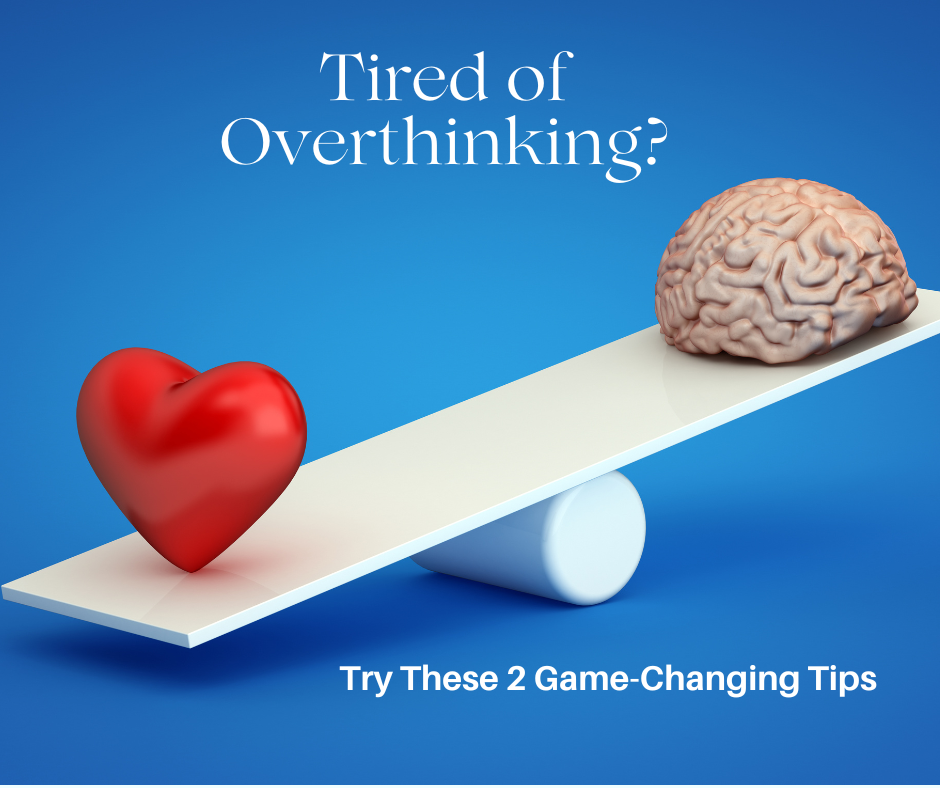2 Simple Ways to Stop Overthinking for Good!
Overthinking. It’s something so many of us struggle with, and yet it feels impossible to break free from its grip. Even when we’ve moved on from difficult situations or distanced ourselves from toxic relationships, our minds can keep spinning around the past—replaying moments, imagining confrontations, or wishing things could have gone differently. If you’ve ever caught yourself reliving old conversations in your head, hoping to finally say what’s been eating you up inside, you’re not alone. But here’s the hard truth: most of the time, confronting the person or trying to change the past won’t bring peace. Worse still, even if you were to speak up, the other person might not acknowledge your pain, accept their part in it, or even recognize that they caused any harm.
So, what do we do when overthinking feels like an endless cycle that we just can’t reason ourselves out of? Meditation can offer relief in the moment, but what about those hours when the thoughts creep back in? Today, I want to share two simple yet powerful tools to help you break the pattern of overthinking: journaling and radical acceptance.
1. Journaling: Giving Your Thoughts a Voice
Your thoughts are swirling in your mind for a reason—they need to come out. When you replay conversations or imagine scenarios where you get to confront someone, your brain is trying to process unfinished business. But here’s the thing: sometimes, saying those things directly to the person involved isn’t possible. Maybe too much time has passed, or you know that confronting them won’t lead to any resolution. Perhaps they’ll refuse to acknowledge their part or even invalidate your experience.
This is where journaling can be a game-changer.
Journaling offers a safe space for you to express everything you’ve been holding inside. You can finally say all the things you wanted to, without the fear of consequences. No one will interrupt, dismiss, or judge your words. You can write out every detail of how you feel, every hurt, every anger, and every thought you’ve kept bottled up for so long. The beauty of journaling is that once those words are out of your head and onto paper, they lose some of their hold over you. It’s as if you’ve finally spoken your truth, and now the weight is lighter.
Try this: the next time you find yourself caught in the web of overthinking, grab a pen and start writing. Write as if you’re speaking directly to the person or situation that’s on your mind. Don’t hold back. Let it all flow—the good, the bad, the ugly. You’ll be amazed at how much lighter you feel once those thoughts are no longer trapped inside your mind.
2. Radical Acceptance: Letting Go of Control
One of the reasons we overthink is that we’re holding on to a desire to control what we can’t change. We wish we could rewrite the past, handle situations differently, or make others see our point of view. But here’s the thing: trying to change something that’s already happened or expecting someone else to behave in a certain way is a recipe for frustration and endless mental loops.
This is where radical acceptance comes in.
Radical acceptance means acknowledging reality as it is, not as we wish it would be. It’s about accepting that we cannot change the past, nor can we force anyone to understand, admit fault, or behave the way we want them to. Instead, we focus on accepting what is, and we release the need for things to be different.
Here’s how you can start practicing radical acceptance: reflect on your situation and ask yourself, “What am I resisting?” Is it the fact that you didn’t speak up when you had the chance? Is it the feeling that you were wronged but never got closure? Once you identify what you’re holding on to, give yourself permission to let go. Accept that what happened is beyond your control now. And more importantly, forgive yourself for any mistakes or missed opportunities from the past. You did the best you could at the time, given who you were and what you knew.
Radical acceptance doesn’t mean we like or approve of what happened—it simply means we recognize that fighting against it only brings more suffering. When we accept things as they are, we free ourselves from the burden of needing to change them. And in that acceptance, we find peace.
Final Thoughts
Overthinking is often our mind’s way of trying to process unspoken thoughts and unresolved feelings. But when we constantly replay scenarios or hope for a different outcome, we’re giving more power to the past than it deserves. Through journaling, you can release those thoughts and emotions in a healthy way, giving them space to breathe outside your mind. And through radical acceptance, you can let go of the need to control or change what can’t be undone, opening yourself up to peace and healing.
The path to inner peace doesn’t require complex strategies or hours of meditation. Sometimes, it’s as simple as putting pen to paper and learning to say, “It is what it is, and I’m okay with that.”[/vc_column_text][/vc_column][/vc_row]






